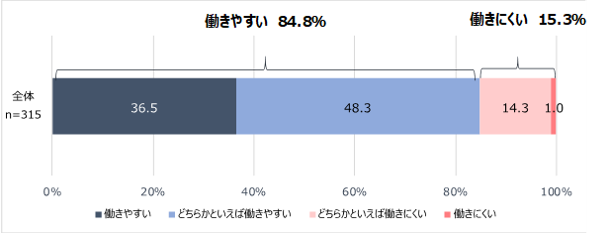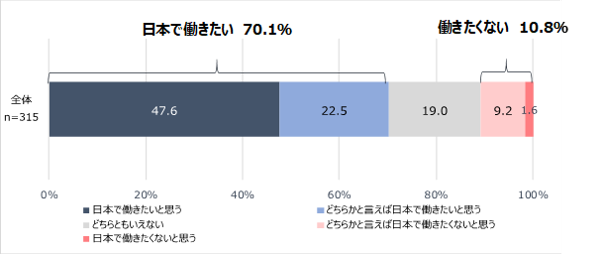“What part time job should I get…?” is the question international students in Japan worry over when looking to work between studies in Japan. In this article, we introduce some part time jobs that are popular with international students and what to expect from them.
Table of Contents
- What's “part time job” in Japanese?
- What do international students think of part time work in Japan?
- Recommended Part Time Jobs for International Students
- Most Popular Part Time Jobs in Japan
- Things for International Students to Watch Out For
- Takeaway
 Are you having any issues with job-hunting in Japan?
Are you having any issues with job-hunting in Japan?
What’s “part time job” in Japanese?
Part time job is called arubaito (アルバイト), short form baito, or paato taimu (パートタイム), short form paato in Japanese.
What’s the difference between arubaito and paato?
Arubaito is derived from the German word for labour or work, “arbeit”; paato on the other hand is from “part timer” in English. Both arubaito and paato translate to “part time job” in English. Legally speaking, there is no differentiation between them, meaning insurance, pension, paid leave won’t be affected.
|
Arubaito |
Paato |
|
Original: Arbeit (German) |
Original: Part Timer (English) |
|
By students, as a main job or second job |
By housewives / househusbands |
|
Will be working for short term image |
Will be working long term image |
|
More days a week and more hours a day |
Lesser days a week and lesser hours |
Writer's Pick
What do international students think of part time work in Japan?
In 2021, MyNavi Corporation conducted a Survey on International Students Working Part Time in Japan (“在日外国人のアルバイト実態調査(2021年)”). The survey targeted students aged 16 years old and above who were working part time in Japan. A total of 315 responses were received on the online survey.
How is your current workplace? 「現在の職場は働きやすいか」

Image Credit: © Mynavi Corporation
The majority, 84.8% of survey participants, answered that their part time job is easy or rather easy. Many reasons for their answers included: fun working (49.1%), convenient location (30%), working hours as requested (28.5%), high salary (25.5%), and good relationships with co-workers (25.1%).
The remaining 15.3% of participants answered that their part time job is difficult or rather difficult. Problems they were facing at work included: excessive work (35.4%), difficulty to take leave (20.8%), not receiving proper work evaluation (18.8%), lack of understanding cultural differences (18.8%), and not given much power to act discretionally (16.7%).
Do you want to continue working in Japan? 「今後も日本で働きたいと思うか」

Image Credit: © Mynavi Corporation
10.8% of respondents leaned towards not wanting to work in Japan, of which 1.6% were clear on not wanting to work here and remaining 9.2% would rather not work here. And, 19% of participants answered “Can’t Say” 「どちらともいえない」. And a large majority of 70.1% want to continue working in Japan or are keen on continuing working in Japan.
What did you consider difficult about finding a part time job in Japan?「日本でアルバイト探しをする際に大変だと思うこと」
The biggest problem faced by international students seeking part time work in Japan was the lack of or limited part time job vacancies available to foreigners. 59.7% of respondents felt this way.
Aside from that, the majority of issues faced were related to Japanese language proficiency and preparation for job interview: preparing Japanese resume & documents (45.7%), required Japanese level (42.5%), interview (31.1%), understanding working conditions (24.8%), difficulty understanding job postings in Japanese (21.6%).
Some people also faced difficulty with getting permission to work as an international student (visa procedure) (22.2%) and a few people did not know how to start finding a part time job (3.8%). Only 5.7% of respondents had no problem finding part time jobs in Japan.
We’re here to help, read these:
What is your current part time job occupation? 「現在の職種」
Answers to this question uncovered that most international students found employment in these occupations (from high to low):
-
Eatery - restaurant, cafe, etc. (23.5%)
-
Konbini (19.4%)
-
Education - tutoring, teaching, etc. (13.3%)
-
Office Work (10.5%)
-
Sales & Customer Service (9.8%)
-
Hotel (3.5%)
What sector do you want to work in?「やってみたい職種」
When asked the question, respondents answered as follows (from high to low):
-
Office Work (29.8%)
-
Education (27%))
-
Eatery (21%)
-
Konbini (20.3%)
-
Hotel (20%)
-
Sales & Customer Service (18.7%)
※ Mynavi Corporation Career Research Lab, “在日外国人のアルバイト実態調査(2021年)”
For full results and details of the survey, visit the survey’s page at MyNavi:
Recommended Part Time Jobs for International Students
Without further ado, we’ll introduce popular and recommended part time jobs for international students. Many of these appeared in respondents’ answers in the survey mentioned above.
Restaurant Staff

Restaurant includes family restaurants, cafes, and izakayas. Staff positions can be further divided into hall staff and kitchen staff.
Work Scope
Hall staff (ホールスタッフ) refers to waiter/waitressing or table service staff. Your duties will include welcoming and seating customers, taking orders, delivering orders, and cleaning up the tables. Depending on the store’s policy, you may also be tasked with handling payments (some places only let full time staff do this).
Kitchen staff (キッチンスタッフ) will help out with cooking, prepping and dish washing in the kitchen. You may also need to clean the kitchen. Interactions with customers are limited to none. In smaller scale restaurants like cafes with fewer staff, you may need to help out in the front as well.
Why this?

Makanai (まかない staff meals) are usually provided at restaurant jobs which can help you save on expenses. Additionally, restaurants are quite open to hiring international students which means fellow foreigner colleagues and plenty of job opportunities. Interacting with customers is also a great way to improve your Japanese, you’ll also get to hear some interesting stories.
Difficulties You May Face
Memorising the menu (hall staff) and recipe (kitchen staff) is a lot harder when it’s in a language and cuisine you’re not familiar with. It’ll be difficult at first but you’ll be fine when you get used to it. Another problem is Japanese, locals speak fast which means you might take the wrong order. Again, the more you listen, the better you’ll get at it. Another thing to keep in mind is stamina, you’ll be on your feet a lot or bustling around carrying plates so consider your physical abilities before applying.
Mover

If you are confident in your physical strength, being a mover for a moving company is an option to consider. There’s hardly any customer interaction so you’ll be fine as long as you can understand instructions from your boss.
Work Scope
As a mover, you will be travelling a lot by truck. Quite straightforward, you’ll visit customer’s houses as part of a team of movers to help move everything to the truck, travel to the destination and move everything back out. Depending on the requested service, you may need to pack/unpack customer’s things as well.
Why this?
Many moving staff are hired on a one-off basis and get paid higher salaries. You can also finish your work earlier than scheduled once your work is done. Unlike other jobs where you will be based in one place, movers go wherever their customers are so you can enjoy travelling around in a truck to places you would not otherwise visit.
Difficulties You May Face
Spring is the peak moving season in Japan which means you’ll be extra busy during this time. Expect overtime so arrange your shifts carefully to not affect your studies.
Convenience Store Staff

One of the most popular jobs for international students (and Japanese).
Work Scope
Mainly cashier, product restocking, and cleaning. Other things you will need to learn include courier reception, and managing the copy machine and ticket machine.
Why this?
Konbini frequently hires foreign nationals including international students which means you can apply to work together with a friend or make some new friends easily. Also, since konbinis are usually open 24 hours, you can work at any time that suits you best taking into account your lessons and studies. The large number of konbinis everywhere also means you can choose to work near home or near school.
Difficulties You May Face
There’s a lot of things to learn at a konbini job which means a steeper learning curve. Additionally, you will require a certain level of Japanese as customers may ask questions. On such occasions, you can always call for your colleague to help. If you are worried about unruly drunk customers in konbini working horror stories, just avoid working late night shifts and you should be fine.
We have a dedicated article for this covering detailed work scope, expected salary, and level of Japanese required:
Part-Time Jobs in Japan: Working in Konbinis
Hotel Staff

This part-time job is recommended for international students with high Japanese proficiency. Hotel staff positions can be further divided into front desk staff, bellboy, and cleaning staff.
Work Scope
Front (フロント) staff refers to front dask reception. You will handle guests check-in/check-outs, phone calls, and manage room reservations.
Doorman (ドアマン) refers to bellboys or porters. You will welcome guests at the hotel’s front door, carry guest’s luggage, and guide them to their rooms. At times you will be asked questions about the hotel, about tourist destinations to visit, and how to get there.
Cleaning staff is self-explanatory. Guest interactions are limited to none as you will be tidying up hotel rooms whilst guests are away or when they’ve checked out.
Why this?
International guests are commonplace in hotels so naturally hotels need staff with foreign (not Japanese) language skills. Not only can you make use of your native language, you can also enhance your Japanese. More importantly, having work experience at a hotel highlights your Japanese proficiency in your resume for future job-searching.
Difficulties You May Face
Especially for front staff, fluent Japanese is extremely important. You need to know proper Japanese customer service, keigo, and correct usage of honorifics. Therefore, getting the job in itself is already difficult. Depending on the hotel and location though, foreign language may be prioritised in which case they will let it slide that your Japanese is not up to hotel levels.
Language Jobs

Make the most of your native language abilities with part time jobs like translation, interpretation, and tutoring.
Work Scope
Translators will be translating from Japanese to another language or vice versa. You will require high proficiency levels in both languages. Books, websites, articles, manuals, etc. there are a large number of options available to you.
For a more detailed look at translation jobs:
Part time Online Translating or Full time Japanese Translator Job Opportunities
Working in the Field of Japanese-English Translation
Interpreters will be translating on-the-go to facilitate communication between people that do not share the same language. High level of language proficiency is also required, plus abilities to listen well and understand context.

Language Teachers will teach Japanese students (adults too) foreign languages. Teaching materials and lesson plans are provided which makes the job easy to get accustomed to. Japanese proficiency is also not a requirement.
Why this?
Make the most of your native language abilities. Salary is also relatively high as compared to other jobs for international students. Additionally, it does not require much physical prowess which may be more suitable for some people. Another bonus is that many of these positions offer remote work options.
Difficulties You May Face
For translators and interpreters, a high level of language proficiency is required so landing a job itself can be difficult. On the other hand, language teachers need to be able to explain things in such a way that students can understand. With limited Japanese skills, this may be difficult.
Most Popular Part Time Jobs in Japan
In case you’re wondering what part time jobs are popular amongst the Japanese, these are the 5 most searched part time jobs in Japan for the year 2022 by Baitorupo:
-
Convenience Store Staff
-
Cram School / Private Tutor
-
Izakaya Staff
-
Cafe Staff
-
Cinema Staff
※ バイトルポ, “人気バイトランキング【全48業種】「2022年に人気のバイト(業種)は何か?」”
Things for International Students to Watch Out For
A very important article to read for international students wanting to get a part-time job:
Permission for International Students to Work
Before you start applying for a job, make sure you’ve received permission from immigration to work.
If you’ve not yet come to Japan, we recommend getting permission at the airport immigration customs when you arrive in Japan.
If you’re already here, you will have to apply to your regional immigration branch office for permission. This can now be done online provided you carry a My Number Card.
The permission will be stamped on the back of your residence card as so,
許可:原則週28時間以内・風俗営業等の従事を除く
※ ISA, “Permission to engage in an activity other than those permitted by the status of residence previously granted”
Working Time Limit: 28h/week
Except for long school holidays when the working time limit is extended to 8h/day to a maximum of 40h/week.
Takeaway

For international students, restaurant, konbini and language jobs are popular. When it comes to picking a job, it is recommended that you choose one that suits you best. Some things to consider are your Japanese proficiency, physical abilities, personality, schedule, and financial needs. Balance your studies and part time work well to truly enjoy your international student life in Japan.

































